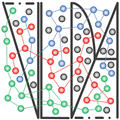Jonny has again updated the universal conflict of law rules. The rules have been simplified, and hopefully improved.
First,the rules are updated to include the “No Hypocrisy” rule discussed in the immediately preceding posts. This was done by adding a new last sentence to paragraph 3(a). Please see the preceding posts for further discussion of the No Hypocrisy rule.
Second, all rules dealing with selection of law in cases where either of the defendant or plaintiff has not adopted a voluntary law are removed. Such provisions are unnecessary, because the existence of a claim requires that the plaintiff has adopted a voluntary law. Also, for the defendant, voluntary jurisdiction over the person requires that the defendant has either adopted a law prior to the claim arising, or will do so afterwards because she prefers to resolve the claim in a voluntary forum. So it will always be possible to determine the laws that have been voluntarily adopted by plaintiff and defendant. This is in essence a jurisdictional aspect of voluntary law.
Jurisdiction over a person in voluntary law is always voluntary. It arises by the person adopting a voluntary law sometime prior to the adjudication of the claim. After having agreed to appear, if the person has not already adopted a law pertinent to the case, she will certainly do so prior to the adjudication to influence the outcome of the process as much as possible.
Late (post-claim) adoptions of voluntary law may occur frequently in transitional societies including both voluntary law society members and non-members, when a member decides to bring a claim against a non-member. To avoid being sued in a statist court, the defendant may join a voluntary law society by publicly adopting a published voluntary law. At that point, the plaintiff must either proceed in the voluntary law forum and forsake any state-imposed remedy, or sacrifice his reputation as a voluntary law society member and become subject to liability under voluntary law for unnecessarily resorting to a statist court.
This jurisdictional rule allowing late adoption of voluntary law facilitates expansion of voluntary law societies. Once dispute resolution services of competitive quality become available, non-adopters of voluntary laws will naturally be drawn into voluntary law society membership to take advantage of the unique and beneficial qualities of voluntary law for defendants, like the ability to control which law is applied in a dispute resolution and lower process costs due to free competition in dispute resolution services.
Some short-sighted persons may craftily adopt and renounce voluntary law for opportunistic reasons. Such persons may sometimes escape liability under voluntary law, but will quickly destroy their reputations and currency in voluntary law societies. They will be few and transitory.

